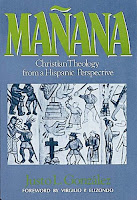Years ago, I first heard of Justo Gonzalez when I was assigned to read his two-volume The Story of Christianity, which is still far and away the most engaging work of Christian history I have read, as well as likely the most comprehensive since it goes beyond European and North American history. At some point, I also became interested in reading Christian theology written by those from non-European cultural backgrounds like Toyohiko Kagawa. I believe that's when I came across Gonzalez's book Manana. I'm finally reading it now, and it has been very insightful in spite of being over 30 years old, likely because it includes much of the historical perspective which Gonzalez is so good at writing. Some excerpts...
In short, biblical history is a history beyond innocence. Its only real heroes are the God of history and history itself, which somehow continues moving forward even in spite of the failure of its great protagonists. Since this is also the nature of Hispanic history, it may well be that on this score we have a hermeneutical advantage over those whose history is still at the level of guilty innocence, and who therefore must read Scripture in the same way in which they read their own history.
To those who think of their own history in terms of high ideals and purity, this may seem to detract from the power and inspiration of Scripture. This, however, is not the case with Hispanics. We know that we are born out of an act of violence of cosmic proportions in which our Spanish forefathers raped our Indian foremothers. We have no skeletons in our closet. Our skeletons are at the very heart of our history and our reality as a people. Therefore, we are comforted when we read the genealogy of Jesus and find there not only a Gentile like ourselves but also incest and what amounts to David's rape of Bathsheba. The Gospel writer did not hide the skeletons in Jesus' closet but listed them, so that we may know that the Savior has really come to be one of us--not just one of the high and the mighty, the aristocratic with impeccable blood lines, but one of us. (77-78)
A book of
"Bible stories" usually includes the story of David and Goliath, but not
of David and Bathsheba; the story of Solomon's wisdom in threatening to
divide the disputed baby, but not of Solomon's idolatry. This is a
subtle way of disparaging the Old Testament, for it amounts to improving
on it. (78)
This semi-Marcionism holds that since Jesus is the final and supreme revelation of God, the whole of Scripture is to be read and interpreted from the viewpoint of his message. This is true as far as it goes. But it forgets that since the Old Testament is the history of God's revelation and action in preparation for the coming of Christ, the message of Jesus must also be interpreted in the light of that revelation and action. In other words, the argument of the new semi-Marcionites fails in that it takes for granted that without the preparation of the Old Testament, we know what Jesus' message is. History shows that this is not true, for in the early church, as increasing numbers of Gentiles began to join the Christian community, it was clear that these Gentiles needed the background of the Old Testament in order to understand what the message was all about. Otherwise, they risked viewing Christianity as the gnostics and Marcion did. (81)
Thus the "apolitical" Christianity that many advocate is in truth a Christianity that supports the politics that exist, that is, the power of those who are presently powerful. (83)
(All emphasis is added.)
Anyways, I've just gotten to the more theological section, so maybe I'll have more later, but the first half of the book is very insightful whether one agrees with all of it or not.
